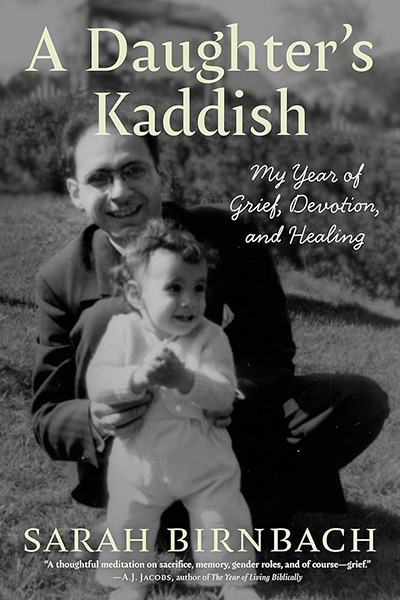 A Daughter’s Kaddish
A Daughter’s Kaddish
Sarah Birnbach's uplifting memoir, A Daughter's Kaddish: My Year of Grief, Devotion, and Healing, chronicles how she kept her vow to say prayers for her father's soul twice daily for eleven months, in accordance with Jewish law.
The Kaddish, a Hebrew blessing praising God's peerless attributes, is the traditional mourners' prayer. Jewish rituals require a minyan (quorum of ten people). Birnbach's challenge was to find a minyan for morning and evening prayer every day, while her job and family obligations required frequent travel—sometimes to locations where the only synagogue was an Orthodox one that didn't count women as members of a minyan.
Birnbach constantly had to grapple with how to integrate her feminism into her Jewish observance, and whether to prioritize the obligations that her beloved father would have wanted, even when the context invalidated her grief. After all, it's pretty insulting to be told that you, the mourner, don't count in God's eyes as much as any random male stranger. Swallowing her emotions for the sake of parental loyalty came all too naturally to Birnbach, who as a child would cover up that her narcissistic mother beat her and her sisters. Her Kaddish journey gave her a beautiful opportunity to receive nurturing from many people, and to break patterns of being the perfectionist first-born daughter who couldn't ask for help.
A Daughter's Kaddish excels at two of the main things that I look for in a memoir. It's tightly structured around a significant period in the author's life, which gives it a built-in narrative arc. And it uses the author's personal experience as a means of exploring wider social, historical, or philosophical concerns.
Birnbach explains Jewish religious terms, traditions, and beliefs in great detail, making the book accessible to readers with no familiarity with the subject. Occasionally this slowed down the story, but in general, I enjoyed learning more about practices that had been in the background of my mostly secular but culturally Jewish upbringing.
It was hard sometimes to see the author trying to minimize her feelings of rejection, and how she strained to look on the bright side despite her anger at God for her father's death. She idealized her father a great deal, understandably, since he was kind and playful while her mother was emotionally cold. Birnbach is able to balance her pain about her mother's mistreatment with empathy for the hardships that made her this way.
However, it takes two parents to create an unhealthy dynamic. Consciously or not, a parent may fail to intervene in his partner's conflict with the kids because he likes being "the good guy". How could her father not notice abuse so severe that it once sent the author to the hospital with a broken bone? But she never voices disappointment that he didn't step up. Birnbach is a family court therapist with training in family systems psychology, so her blind spot about his shared responsibility for the tenor of the household left me feeling unsettled. The book was published in 2022 about events taking place from 2000-01, enough time for more complex emotions to surface after the initial grieving period.
Despite my personal feelings about this aspect of the narrative, I would highly recommend A Daughter's Kaddish to bereaved families from all backgrounds who are looking for practices to shepherd them through their loss. The book demonstrates how communal rituals of any kind can counteract the isolation that grief often brings. It would be a great book club selection. Birnbach's website includes some discussion questions for this purpose.









